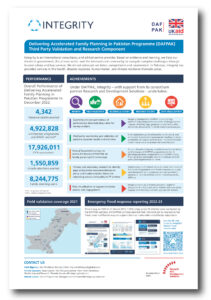Integrity Insights: Evidence-backed family planning programming in Pakistan
As part of our work on health and family planning in Pakistan, Integrity joined a two-day event in May 2023, Pakistan’s Population: A Brighter Future for All. Organised by the British High Commission (BHC), the aim was to mark a decade of evidence-backed family planning programming in Pakistan by the BHC and to share the lessons learned with the key stakeholders. Integrity was represented by Ahmed Jawad, Senior Manager, Monitoring, Evaluation, and Learning and Pamela Sequeira, Integrity Team Lead.

Integrity’s Pamela Sequeira and Ahmed Jawad at the event
Integrity, with its partner Research and Development Solutions, is the Third-Party Validation and Monitoring and Research lead for Delivering Accelerated Family Planning in Pakistan (DAFPAK) programme – the UK Foreign, Commonwealth and Development Office (FCDO) £90m, multi-year investment into family planning across Pakistan. DAFPAK was one of the programmes under the spotlight at the event. With Integrity and the implementing partners, the BHC facilitated insightful conversations, shared best practices, and engaged with key experts and stakeholders in the family planning sector.
Showcasing innovation and creativity

Integrity’s infographic poster designed for the event
The event format facilitated discussions about population management, family planning, and sustainable development in Pakistan. Poster presentations by all BHC partners showcased that creativity and innovation are crucial in advancing efforts in family planning and population management. Integrity’s DAFPAK poster highlighted monitoring, validations, surveys, data visualisations and research work, while separately we screened an overview of our global work.
The Honorable Minister of Planning Development and Special Initiatives – Mr. Ahsan Iqbal Chaudhry – was the Chief of Guest. The event was also attended by senior government officials, public health experts, and other notable development professionals.
Three key messages shared during the event were:
- The critical need for a multi sectoral, integrated, and coordinated approach to reach the FP2030 Roadmap objectives. Emphasis was also placed on the availability of robust data, political will, and motivation of government to implement policies.
- The role of public-private partnerships in sustainable family planning was another significant area of focus. Evidence was shared regarding the importance of collaboration across sectors as being essential to leverage resources, expertise, and reach – especially in underserved areas and urban slums.
- The importance of international collaboration among the family planning donors was also highlighted. It was stressed that the donors and development partners needed to play a catalytic role to create an enabling environment. One important point of reflection was that the donor community’s contributions are not just about funding, but also about bringing global best practices, technical expertise, and a commitment to shared goals.
The event recognised that achieving these goals requires not only a focus on family planning but also a broader understanding of interconnected issues like gender equality, education and targeting youth. The importance of girls’ education and women’s empowerment as catalysts for fertility decline was also highlighted. The discussion stressed the urgent need for strategies that address socio-cultural norms and barriers to education and gender equality.
Why learning is vital
Evidence-backed family planning programming – it was emphasised – should not be seen through a medical lens but from a rights-based perspective. The event demonstrated that successfully implementing these practices requires adaptive strategies that are context-specific and can overcome unique challenges in different regions. Additionally, the event reinforced the value of lessons learning and fostering learning from successful initiatives, both in terms of what works and what does not, to inform future interventions.
